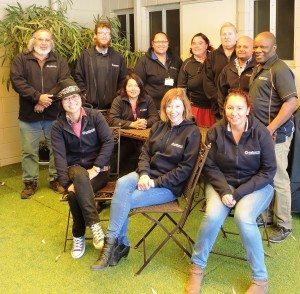More Than A Housing Program
Providing shelter is one solution in reducing homelessness. However, homelessness is generally symptomatic of a range of other issues, which if not addressed, could cause homelessness to become episodic. Whilst the core business of Anglicare NT’s Housing Support Services (HSS) in Alice Springs is addressing housing and homelessness concerns, the issue of employment has also being tackled this year by the HSS team. By building resilience and increased independence through workforce participation, the HSS team hopes to reduce the likelihood of recurring homelessness.
Anglicare NT’s Transitional Housing Program (THP) in Alice Springs provides case management support, tenancy skills development training and transitional housing for homeless people with complex needs. Most clients are Aboriginal and, for many, English is a second or third language. In October 2014 THP integrated with Tenancy Sustainability Programs (TSP) to form Housing Support Services (HSS). The rationale behind this development was to optimise use of resources, ensure consistency of practice and to provide a model of seamless service delivery from homelessness to transitional housing and into long term sustainable tenancies. The HSS team consists of a mix of workers with a range of backgrounds, skills and qualifications.
From April to June 2015, HSS focused on exploring opportunities for clients in the Transitional Housing Program (THP) to gain employment. Barriers to accessing jobs were identified, alongside the support required to assist clients into job readiness. Identified barriers included literacy rates, access to childcare, systemic discrimination, not having a drivers’ license, lack of transport, release from Criminal Justice System and possible physical or mental health issues. Specific support provided by case workers to clients for job-readiness includes discussing client interests, linking clients with training courses and employment services, supporting clients to obtain drivers’ licenses, exploring child-care options and providing access to computers for clients to check out jobs and update resumes. Adopting a strengths-focused approach, case workers identify and acknowledge client abilities that may indicate suitable job options.
The employment support is leading to real employment success. At the beginning of April, of the 56 adult THP clients, 3 adults were employed (5.4%). During the reporting period an additional 4 (7%) of the adults gained employment, resulting in a total of 7 employed adult clients at the end of the period (12.5%). “Although their situations were vastly different, each client who gained employment was glad to have the opportunity to gain new skills, broaden their experience, build new relationships and earn some money. They are all hopeful of building on the experiences they have gained,” said Leigh Woolcock, Senior Program Manager of Housing Support Services.
Jacinta, a twenty year old Indigenous sole mother of two young children, has benefited from the support of the HSS team. She became a client of THP in February 2015 after couch surfing in already overcrowded conditions. In case-planning, one of Jacinta’s identified goals was to get a job, perhaps some part-time cleaning work. The support provided by her case worker to achieve this goal included encouraging Jacinta to come into office to use the computer to search for jobs and develop her resume, assisting with several job applications, enrolling Jacinta in a training course, assisting in accessing childcare and providing a reference. Jacinta applied for a part time job and was offered the position. She is enjoying her new job and is gaining new skills and interests. As well as having extra income, it has assisted in reducing her social isolation as a sole parent. In addition, her eldest child is enjoying playing with her new friends in childcare.
Another THP client, Deng, came to Australia as a refugee from The Sudan after losing family members and experiencing torture. Deng suffers from Paranoid Schizophrenia. As well as mental illness, Deng has a range of complex needs and was experiencing isolation. His case worker, Kevin, consulted regularly with Deng’s psychiatrist and explored options to reduce Deng’s loneliness and isolation. Kevin eventually persuaded Deng to accept support from a psycho-social mental health support group and arranged a referral. Kevin encouraged and supported Deng in applying for a cleaning position for 2 hours per day twice a week. According to Deng’s psychiatrist any increase in hours would be too overwhelming for Deng at this stage; however the opportunity to work has been of significant benefit to his mental health.

